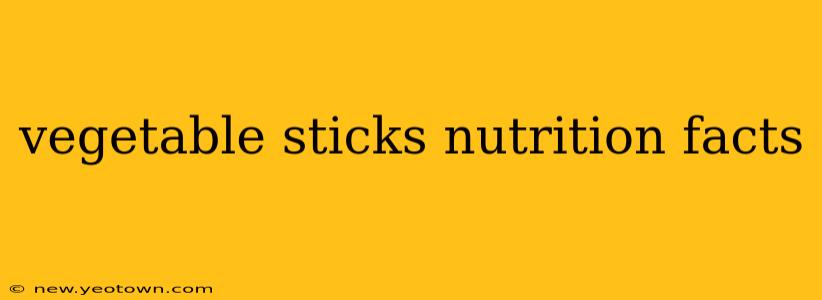We've all been there – reaching for that satisfying crunch of carrot sticks, the refreshing snap of celery, or the sweet bite of cucumber. Vegetable sticks are more than just a healthy snack; they're a nutritional powerhouse packed with vitamins, minerals, and fiber. But what exactly makes them so beneficial? Let's dive into the delicious details.
What are the nutritional benefits of vegetable sticks?
The beauty of vegetable sticks lies in their versatility. Different vegetables offer a unique blend of nutrients, creating a customizable and incredibly healthy snack. Generally, they are low in calories and high in essential vitamins and minerals. This makes them ideal for weight management, providing satiety without the guilt. The high fiber content also aids digestion and promotes gut health, contributing to overall well-being. Think of them as tiny nutritional powerhouses, boosting your daily intake of essential nutrients with every satisfying munch.
What are some examples of popular vegetable sticks and their nutritional value?
Let's explore some popular choices and their nutritional profiles:
Carrots: The Beta-Carotene Boosters
Carrots are well-known for their high beta-carotene content, which the body converts to Vitamin A. Vitamin A is crucial for eye health, immune function, and cell growth. They also offer a good source of fiber and potassium, contributing to digestive health and maintaining healthy blood pressure.
Celery: The Hydration Heroes
Often overlooked, celery is a surprising nutritional champion. It's incredibly hydrating, thanks to its high water content. It also boasts vitamins K and C, important for blood clotting and immune function, respectively. Plus, it contains a decent amount of fiber, further contributing to digestive regularity.
Cucumbers: The Cooling Crunch
Cucumbers are low in calories and high in water content, making them a refreshing and hydrating snack. They're a good source of Vitamin K and contain antioxidants that may help protect cells from damage.
Bell Peppers: The Vitamin C Champions
Bell peppers, especially red ones, are packed with Vitamin C, a potent antioxidant essential for immune function and collagen production. They also contain beta-carotene, which your body converts into Vitamin A.
Are vegetable sticks good for weight loss?
Absolutely! Vegetable sticks are a weight-loss ally for several reasons. They are low in calories and high in fiber, promoting satiety and preventing overeating. The fiber content helps regulate blood sugar levels, preventing energy crashes that can lead to unhealthy snacking. Moreover, the vitamins and minerals they provide support overall metabolic function.
What are some creative ways to make vegetable sticks more appealing?
While vegetable sticks are delicious on their own, there are many ways to make them even more appealing:
- Dips: Pair them with healthy dips like hummus, guacamole, or Greek yogurt-based dips for added flavor and protein.
- Spices: Experiment with different spices to enhance the flavor. A sprinkle of paprika, cumin, or garlic powder can transform a simple carrot stick into a flavor sensation.
- Variety: Offer a colorful assortment of vegetable sticks to keep things interesting. The more variety, the wider range of nutrients you’ll consume.
How many vegetable sticks should I eat per day?
There's no magic number, but incorporating vegetable sticks into your daily diet is always beneficial. Aim for a portion size that complements your overall calorie intake and dietary goals. A good starting point would be at least one to two cups of various vegetable sticks per day.
In conclusion, vegetable sticks are a convenient, delicious, and highly nutritious snack that deserves a prominent place in a healthy lifestyle. Embrace their crunchy goodness and reap the rewards of their extensive nutritional benefits. So, grab a handful, and savor the deliciousness knowing you're nourishing your body with every bite!

